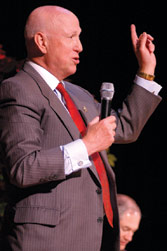Economic forecasts can be tricky, and the events of 2008 caught many experts by surprise. So it was with a note of caution that two noted economists offered their best guesses as to what lies ahead.

Despite that dose of circumspection, David W. Berson and James F. Smith told more than 400 people in UNCA’s Lipinsky Auditorium that the recession will probably end in the fourth quarter of this year, but the recovery in the job and housing markets will be modest. The attentive crowd, gathered for the 25th annual Economic Crystal Ball Seminar, was double the biggest previous draw.
Based in California, Berson is chief economist for the PMI Group and a former vice president and chief economist at Fannie Mae. Smith, who lives in Arden, is chief economist for Parsec Financial. Both are nationally known for their forecasts.
Berson noted that he’d previously predicted the recession would end in 2008. “There are many reasons why a forecast can be wrong. In this particular case, I think there was a very good chance that the recession would have ended up being relatively short and mild, but there were some very bad policy errors made last fall,” such as the decision not to bail out Lehman Brothers, he maintained.
And Berson tempered his prediction of positive economic growth by this year’s end, emphasizing that the job market will be slow to come back. The national unemployment rate will continue to rise through next year, topping out at 9.5 percent or higher, he said.
The first sign of improvement will come in the housing market, Berson believes. Existing home sales “have probably already bottomed,” he said, and housing prices will continue to decline steeply in the hardest-hit parts of the country. But mortgage rates are low, and there’s financial help available for first-time homebuyers. “It’s going to be the first-time homebuyer that’s going to power housing out of this downturn,” he predicted.
Overall, Berson said he’s looking for about 3 percent growth in the economy next year, held down in part by consumers’ continuing hesitation. But even that forecast, he added, is not rock-solid: Another policy error, a dramatic jump in the consumer savings rate or other factors could derail a recovery, Berson said.
“I’d say the risk of that is about 35 percent. So about about a one-third chance this recession continues into 2010, but about a two-thirds chance that it doesn’t.”
Smith focused much of his presentation on the cyclical nature of the American economy, citing signs that he said have preceded every U.S. recession and recounting previous financial panics.
But after every dramatic downturn, Smith maintained, “The global economic system comes back stronger than ever,” and that’s likely to happen again this time. Government leaders, he noted, are throwing trillions of dollars at the problem. Why? “Because they want to get re-elected.”
All that money pumped into the economy, Smith predicted, will jump-start the stock market, and the housing and vehicle markets will follow. Consumer confidence will pick up, and small-business owners will regain their optimism.
Both economists ended their presentations on a high note. “I think things are going to be better soon,” said Smith, echoing Berson’s prediction of an uptick late in 2009.
“There’s still some pain for the next six months or so,” said Berson, “but after that the economy’s going to get better, the housing market’s going to get better, and a year from now, I think the people in this room will feel a whole lot better about what’s going on around them than they do today.”


The truest part of this recitation is at the end: “A year from now, I think the people in this room will feel a whole lot better about what’s going on around them than they do today.”
Because, of course, we come to terms with the world we inhabit.
Hoping that some things will be better does not make them so, though I’m not one to discourage optimism (often donning my own rose colored glasses). But the current depression is unlike previous ones in important ways and to suggest that we will soon be back to business as usual is a pipedream. We are going through a game-changer in food, energy, water and climate.
As Lester Brown pointed out in the current issue of Scientific American, global food shortages are accelerating and are destabilizing governments already rocked by the economic shock. China has become a net importer of food and will drive up already rocketing food prices. At the same time, U.S. biofuel policy is diverting food crops for oil replacement. So we’ll be bidding against China for food and fuel and they are our principal creditor. We can’t say “no” in any global context.
“Go Local” is the best answer and the most hopeful direction for our community. Eat local, shop local, bank local, build local ought to be our new mantra. Local dollars multiply as the baker hires the roofer who buys from the hardware owner who eats at the restaurant which buys from the farmer. We can create a green economy with jobs that won’t go to China and goods that don’t come from there, but it all starts with our wallets. Real recovery demands community recovery. If the national and international economies “recover,” hurray! we still win. And if they don’t bounce back we can succeed in spite of their machinations.
he added, is not rock-solid: Another policy error, a dramatic jump in the consumer savings rate or other factors could derail a recovery, Berson said.
“I’d say the risk of that is about 35 percent. So about about a one-third chance this recession continues into 2010, but about a two-thirds chance that it doesn’t.”